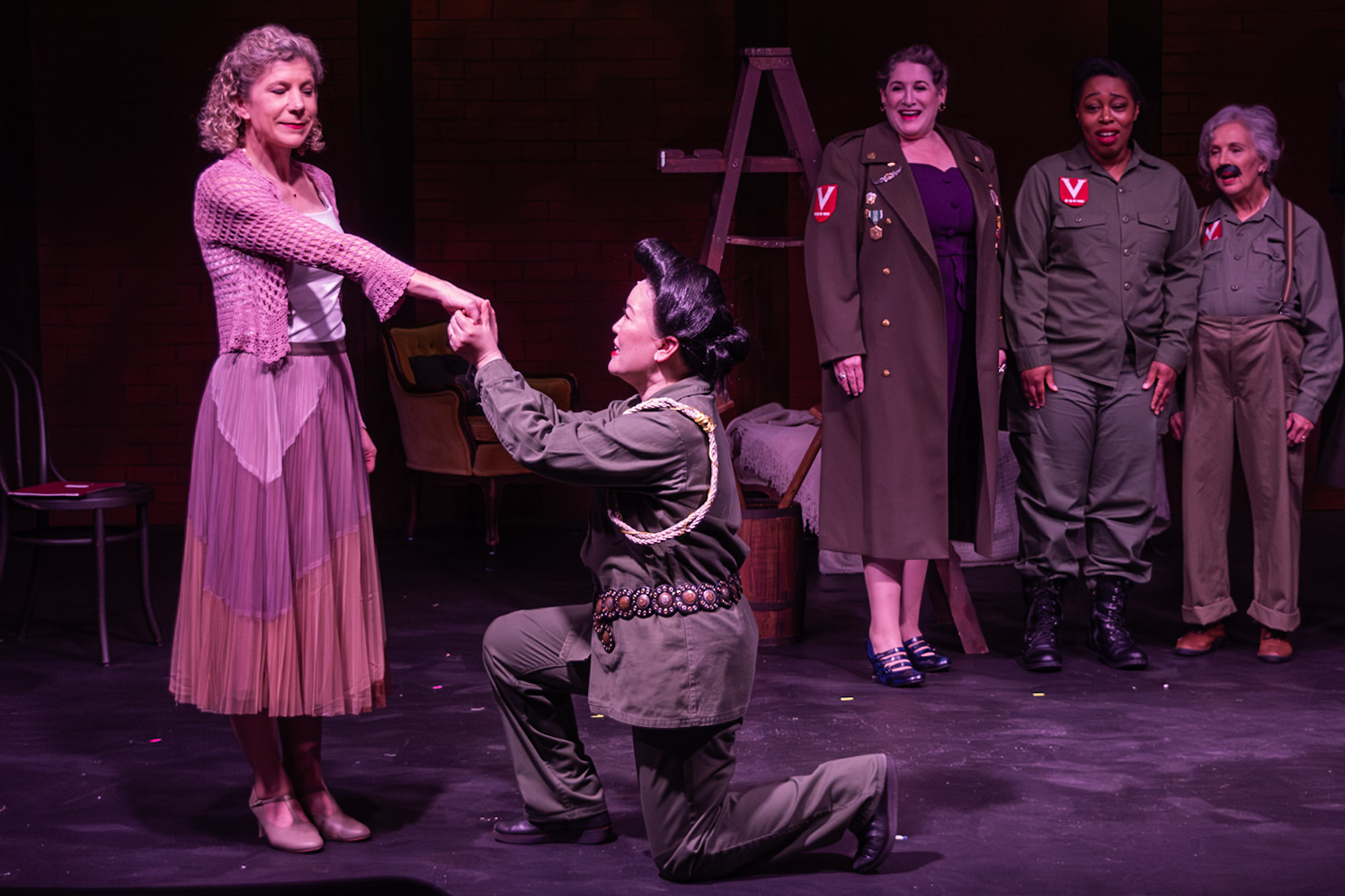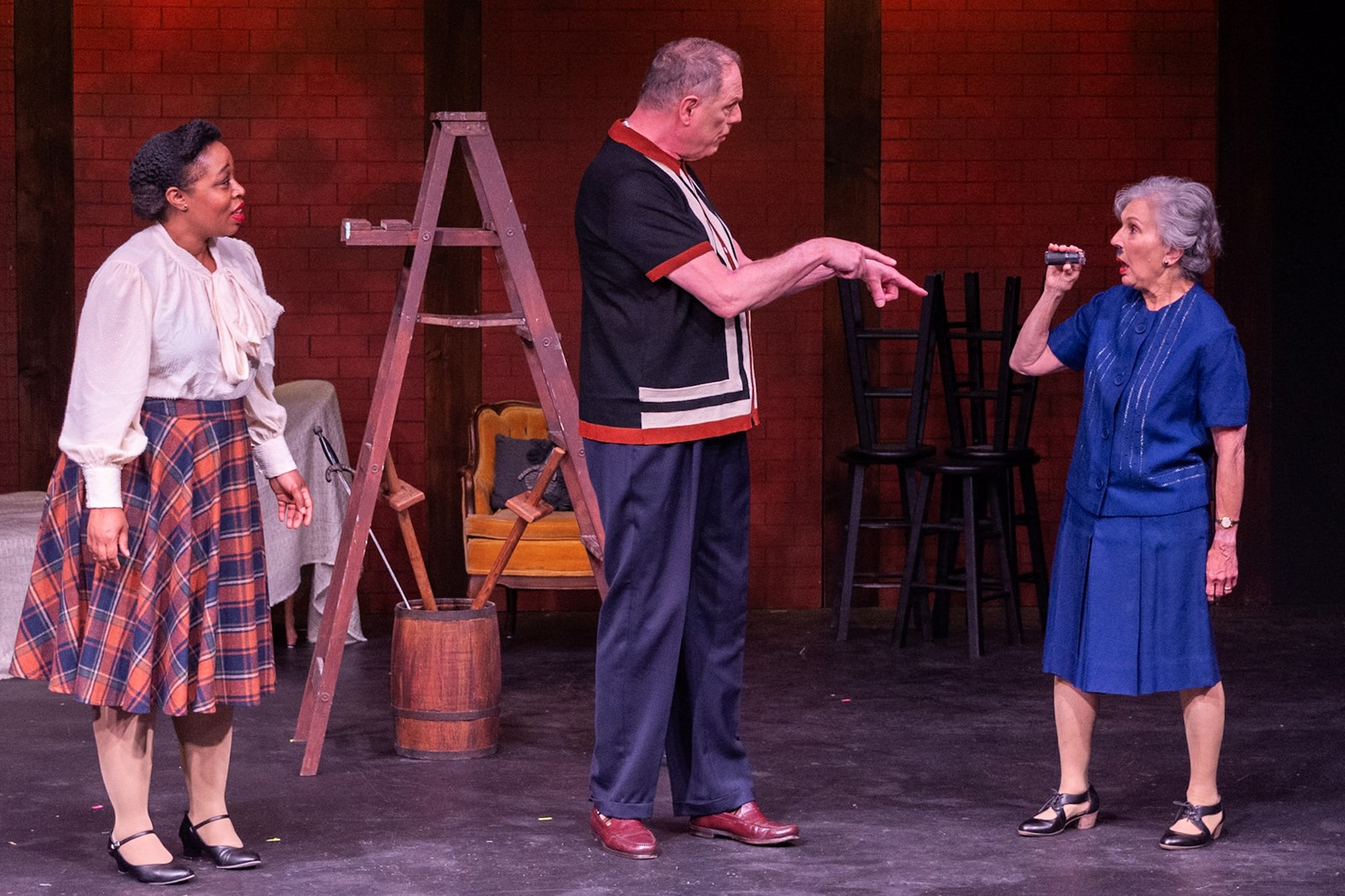

Masquers Playhouse has launched a fascinating bit of local historical fiction with George Brant’s “Into the Breeches!” The lightweight comedy runs at the downtown Point Richmond theater through Aug. 3.
It’s 1942 in Richmond, and most able-bodied men are off at war. A local Shakespearean theater called the Oberon Playhouse is considering shutting down for the duration of the conflict because its male actors are in the service. In the interest of lifting public spirits, the company’s assistant director Maggie Dalton (Katharine Otis) campaigns to continue productions by having the troupe’s female performers take on male roles for a production of “Henriad” — an inversion of the Shakespearean-era practice of having young men perform female roles.
This affront to tradition runs headlong into opposition by company chief executive Ellsworth Snow (Chris Harper), who insists that it would be not only a waste of time and money but would also make the performers the target of many hurled tomatoes. Maggie also encounters resistance from the company’s prima donna, Celeste Fielding (Dana Lewenthal), whose bio includes several appearances as Juliet, despite being far too mature for the role. Lewenthal imbues her theatrical queen bee with a beguiling blend of too-perfect diction and haughty disdain.
Otis gives Maggie an infectious persistent enthusiasm that eventually overcomes both Celeste’s dismissal and Ellsworth’s ultra-conservative refusal to consider an alternative presentation — especially after his wife Winifred (Marin theater veteran Marsha van Broek) insinuates herself into the cast, despite never having appeared onstage. Another Oberon newbie is Grace Richards (Marin theater alum Helen Kim), joined by ditzy June Bennett (Mary Katherine Patterson), both of whom have husbands fighting the Axis powers. Their worries about their mates’ whereabouts and safety are a consistently sober subtheme in the show.
Rounding out the Oberon team are costumer Ida Green (Alana Wagner), an easygoing woman whose husband Joshua is also in the service, and stage manager Stuart Lasker (Gregory Lynch), Maggie’s right-hand man who’s somewhere north of the military enlistment age limit.
The troupe’s small-scale conflicts escalate as Celeste withdraws, then returns. The would-be performers attempt mimicking men by walking around with fake mustaches on their lips and huge codpieces strapped around their hips. Men seldom realize how ridiculous they look until they see women imitating them. In a similar vein, Stuart takes his own stab at gender-bending in a hideous wig and the ugliest dress imaginable. Winifred displays a previously unknown talent for physical comedy with an amusing impression of cigar-chomping celebrity Groucho Marx.
In a predictable but significant plot twist, Ida is promoted from costumer to performer, another affront to tradition provoking Ellsworth’s wrath. The topper comes when Maggie demands that they all be paid — the company’s standard compensation plan included only men. Women always worked for free.
All the action plays out backstage at the Oberon — a simple set of chairs, a desk, a ladder, a costume rack and a brick wall. The actors argue about whether they should tackle the production in Shakespearean attire until Ida has a breakthrough that it should be done in modern dress. She concocts some genderless Army green uniforms emblazoned with “V” for victory badges.
Soon the Oberon Playhouse is pushing socially acceptable limits in several comedic directions at once: exploring racial and gender equality, equity in compensation, acceptance of unconventional lifestyles, classic theater done in modern dress and more — all in the cause of keeping the arts alive in wartime. And all in good fun.
Head of BATS Improv at Fort Mason Center in San Francisco, award-winning director Marilyn Langbehn gets a delightful performance from her eight-member cast at Masquers. The production features plenty of local references — Benicia, Walnut Creek and, of course, Richmond. The theater’s lobby features a beautiful display of wartime photos of the East Bay city by legendary photographer Dorothea Lange. The photos alone are worth a visit. Consider them icing on the theatrical cake.
Barry Willis is a member of the American Theatre Critics Association and president of the SF Bay Area Theatre Critics Circle. Contact him at barry.m.willis@gmail.com


 PREVIOUS ARTICLE
PREVIOUS ARTICLE
